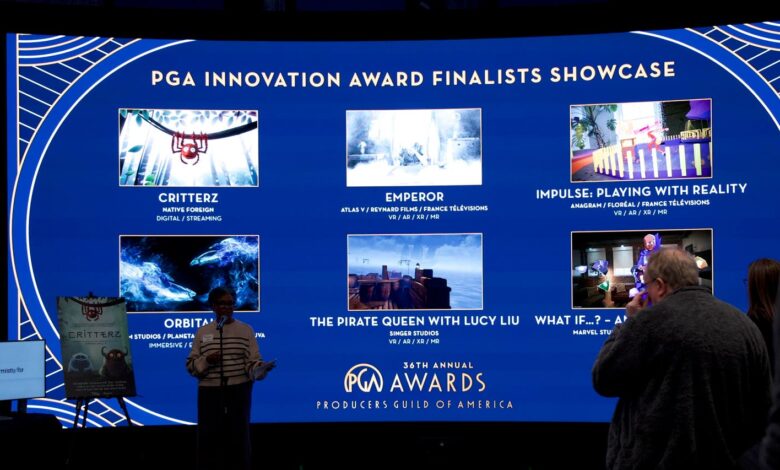PGA’s Innovation Award Showcases What ‘Entertainment’ Can Be In Future

It’s a mark of the disruption that Hollywood has faced the past five years that, when the Producers Guild of America sought to honor innovative immersive experiences, one big change in its fifth year was to showcase the finalists in person, so members could actually experience what makes those experiences special.
The winner of the PGA Innovation Award won’t be announced until later in awards season, during one of the preliminary events to the guild’s own PGA Awards in February, said Associate National Executive Director Michelle Byrd, who runs the awards.
But last weekend, the PGA showcased the finalists at an in-person event designed to give members an easy hands-on experience trying out the next generation of entertainment. That’s important, because the finalists came in several forms distinctly different from traditional film and TV, none of them as easily experienced as punching in a streaming code to watch a film or TV at home.
The experiences ranged from headset-based virtual- and mixed-reality experiences both non-fiction and fictional, on either Meta’s Quest Platform or the Apple Vision Pro headset, shared in-person immersive experiences, and AI-generated narrative shorts. They included
- What If…? – An Immersive Story, from Marvel, Disney+ and ILM Immersive, telling an immersive version of the Disney+ series of alternate takes on superheroes in the Marvel Cinematic Universe;
- Emperor, from France Televisions/Reynard Films, a narrative virtual-reality experience that allows a participant to “travel inside the brain of a father who is suffering from aphasia;”
- The Pirate Queen with Lucy Liu, from Singer Studios, a VR experience about Cheng Shih, a famed female pirate leader in the South China Sea more than 200 years ago;
- Impulse: Playing with Reality, from Anagram/Floreal/France Televisions, a mixed-reality experience portraying the world as seen by people with ADHD;
- Critterz, from Native Foreign, the first animated short film designed wholly using AI-generated visuals from the program Dall-E; and
- Orbital, from Cosm Studios/Planetary Collective, an animated journey following the development of Earth from the Big Bang to life on the planet to mankind heading to space. The project was designed to play in Cosm’s location-based entertainment domes.
Producers Joanna Popper and Eric Schwartz –both with long experience in AI, VR, and related technologies – were co-chairs of this year’s award, pulling together an international jury of people with deep experience either creating innovative next-gen projects, or running festivals that spotlight the work. A call for submissions attracted dozens of projects, which the jury winnowed down to the finalists .
“Submissions came from across even more types of innovation,” said Popper. “You see that from the finalists. This is the first year we had a generative AI-based project. In the finalists, there were three VR pieces, one spatial computing, one AI, and one a dome product from Cosm.”
Importantly, several of the projects also have business models that may be sustainable. Cosm’s project, for instance, is part of the array of immersive location-based entertainment the company offers, including live NBA and NFL games, at a dome near SoFi Stadium and the Intuit Dome in Inglewood, Calif.
“Innovation in and of itself is never a business but it leads to a business,” said Schwartz. “That’s my lens. The six (finalists) that we did, we see a future where these impact consumer trends, or even producing trends. It’s where we see audiences and production moving toward.”
It’s also, in a town overrun with awards-related events for about 10 months of the year, one of the few areas that doesn’t have much in the way of awards that reach somewhat more traditional corners of Hollywood.
As Byrd put it, “There’s not a lot of things they (the interactive creators) get invited to. They don’t really have a machinery” for awards like the seemingly endless Oscar season and nearly as lengthy Emmy buildup.
Some showcases for interactive do reach the filmmaker population, Schwartz said, though fewer now that Sundance Film Festival appears to have largely ended its New Frontiers section. South By Southwest in Austin and the Venice Film Festival in Italy both still have substantial interactive sections, and the Television Academy hands out interactive Emmys each season. Indeed, Impulse won Venice’s Immersive Award earlier this year, and Pirate Queen was nominated for an Emmy.
But Byrd and PGA CEO Susan Sprung said it’s important for the producers to continue to learn about new kinds of entertainment, and begin creating them, especially given the challenges facing more traditional film and TV.
“Many producers are thinking about, ‘Is there a way to increase my portfolio? Is there a department of my company that should be doing this,” Sprung said. “We wanted to show our members all of the truly amazing things our members are doing. It’s unbelievably sophisticated.”
The event was held at the downtown Los Angeles campus of AGBO, the production company founded by Mike LaRocca and the Russo Brothers, who’ve created the two highest-grossing Avengers movies of all time and executive produced the Oscar-winning indie film Everything Everywhere All At Once. That the Russos are famously big fans of using tech innovations in their projects provided “added an extra level of comfort” for more tentative showcase attendees, Sprung said.
Last year’s winner was showcased at the PGA’s Produced By conference last spring. That may happen again at this year’s conference, set for May 31.



